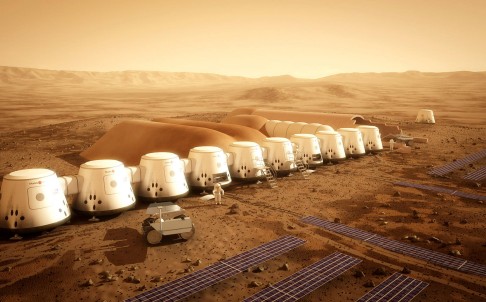- Joined
- Jul 23, 2012
- Messages
- 266
- Points
- 0
Study suggests that humans on Mars may start to die after just 68 days
Oxygen breakthrough needed before planet can be colonised, study finds
PUBLISHED : Wednesday, 15 October, 2014, 10:16pm
UPDATED : Thursday, 16 October, 2014, 3:42am
Agence France-Presse in Washington

An artist's impression of the Mars One base. Photo: SCMP
Space enthusiasts planning a move to Mars may have to wait to relocate: conditions on the Red Planet are such that humans would likely begin dying within 68 days, a study says.
Oxygen levels would start to deplete after about two months and scientists said new technologies were required before humans can permanently settle on Mars, says the study by researchers at the Massachusetts Institute of Technology (MIT).
The five-person team used data from Mars One, a Dutch-based non-profit group behind an audacious project to permanently colonise the Red Planet starting in 2024.
A shortlist of more than 1,000 people from a pool of 200,000 applicants will be whittled down to 24 for the mission - an irreversible move to Mars, partially funded by a reality television show about the endeavour.
But conditions on Mars - and the limits of human technology - could make the mission impossible, for now at least.
"The first crew fatality would occur approximately 68 days into the mission," according to the report, which analysed mathematical formulas on the required oxygen, food and technology.
Plants required to feed the space colony would produce "unsafe" amounts of oxygen, the authors said. "Some form of oxygen removal system is required, a technology that has not yet been developed for space flight," the study concluded.
Shipping in replacement parts is an extra challenge and will likely boost the mission's cost, which the researchers estimated to be at least US$4.5 billion. Mars One co-founder and CEO Bas Lansdorp agreed that sending spare parts to Mars could pose a problem.
"The major challenge of Mars One is keeping everything up and running," he told Popular Science magazine.
But he claimed the researchers used incomplete data, adding that technology for Mars colonisation was nearly ready.
"While oxygen removal has never been done in space, I disagree that the technology is not mostly ready to go to Mars," Lansdorp said. "Of course, the actual apparatus that we will take to Mars still needs to be designed and tested extensively, but the technology is already there."
Many people have voiced doubts about the mission, though the project has won support from Gerard 't Hooft, the Dutch 1999 Nobel Physics prize winner.
_________________________________
Robot returns
The US military’s mysterious robot space plane is expected to land this week after a 22-month orbit, but the craft’s mission remains shrouded in secrecy.
The unmanned X-37B, which looks like a miniature space shuttle, is due to glide back to earth after having launched on December 11, 2012, on a mission military officers say is strictly top secret.
A US defence official said that touch down at Vandenberg Air Force Base in California would depend on technical and weather considerations.
Analysts say the X-37B could be a platform for spying from space, including possibly snooping on other countries’ satellites. But officials have previously denied the project had anything to do with creating a “space weapon” that could knock down other satellites.
The air force says the X-37B can test technology for “reusable” spacecraft and conduct unspecified experiments that can be studied on earth.
The latest mission was the third and the longest so far for the vehicle. An initial flight launched in 2010 lasted about eight months and a second flight had the spacecraft in orbit for more than 15 months.
